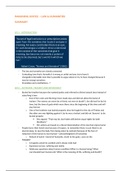Samenvatting
Imagining Justice: Law & Humanity Summary
This summary contains notes from the class and some summaries from the texts which were mandatory for the exam (e.g. Antigone, NAACP v. Claiborne Hardware Co., Plato – Socrates’ defense...).
[Meer zien]




